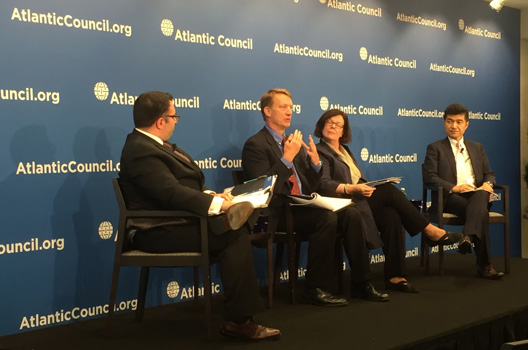 On November 17, the Brent Scowcroft Center on International Security hosted a public launch of the report Japan’s Security Role and Capabilities in the 2020s, authored by Dr. Roger Cliff, Nonresident Senior Fellow at the Scowcroft Center.
On November 17, the Brent Scowcroft Center on International Security hosted a public launch of the report Japan’s Security Role and Capabilities in the 2020s, authored by Dr. Roger Cliff, Nonresident Senior Fellow at the Scowcroft Center.
This event featured keynote remarks by Mr. David Shear, Assistant Secretary of Defense for Asian and Pacific Security Affairs, and a panel of experts consisting of Dr. Cliff; Dr. Narushige Michishita, Japan Scholar of the Asia Program at the Woodrow Wilson International Center for Scholars; and Dr. Sheila Smith, Senior Fellow for Japan Studies at the Council on Foreign Relations. The discussion was moderated by Harry J. Kazianis, Executive Editor of The National Interest. Besides providing their comments on the report, these experts discussed the current Japanese political context regarding Japan’s defense role, US views about this role, and the future of Japan’s Self-Defense Forces, among other topics.
This report is the result of a year-long study of Japan’s future security roles and capabilities. The report recommends that Japan assume a more active role in regional security affairs, but that it is not feasible or desirable for Japan to supplant the United States as the region’s security guarantor or to acquire military capabilities comparable to those of the US military. Instead, the role that Japan should seek to play over the next ten to fifteen years is that of a regional security leader. This entails increasing Japan’s capability to contribute to crises response in the region as well as increasing its capability to respond to security challenges directly affecting Japan.
In his key note remarks, Mr. David Shear provided the US government’s perspective on the issue. First of all, he stated the importance of the rebalancing strategy to the Asia-Pacific region. To meet potential challenges, the US should strengthen its alliances, especially with Japan. The new bilateral defense guideline is not just a regional treaty, but a global treaty in terms of promising US-Japan bilateral contribution to international peace, he said. Additionally, he commented that the Trans-Pacific Partnership (TPP) will positively affect the alliance not only in settling the Japanese domestic economy, but also in encompassing security issue related to economy and politics.
The panel discussion began with remarks from Dr. Roger Cliff. He demonstrated the reasons why Japan should take a regional security leader position and increase its capabilities. However, in terms of the domestic politics, he was concerned about the incremental decision-making process of the Japanese bureaucracy and its extreme nationalism. Dr. Cliff recommended that the Japanese pursue multilateralism and more proactive action. The United States should share operational defense forces and cooperate in the joint development new weapons systems with Japan.
Ms. Sheila Smith commented on Roger’s concerns about Japanese politics: bureaucratic policymaking system and right wing nationalism. The Japanese policymaking system is undergoing revisions: the establishment of security-direct division in government and more civilian leadership engagement. On the basis of these developed institutions, in the last fifteen years, Japan has made considerable achievements in dealing with regional threats from China and the Democratic People’s Republic of Korea (DPRK).
Lastly, Dr. Michishita complemented the session with a Japanese view, stating that Japan has been facing growing threats related to DPRK and China. In terms of DPRK’s military threats, Japan has been taking three security measures: ballistic missile defense, warning systems, and new security legislation. In response to China, there also have been three security strategies: the establishment of Japanese version of the National Security Council (NSC), lifting arms exports, and promoting collective self-defense.
